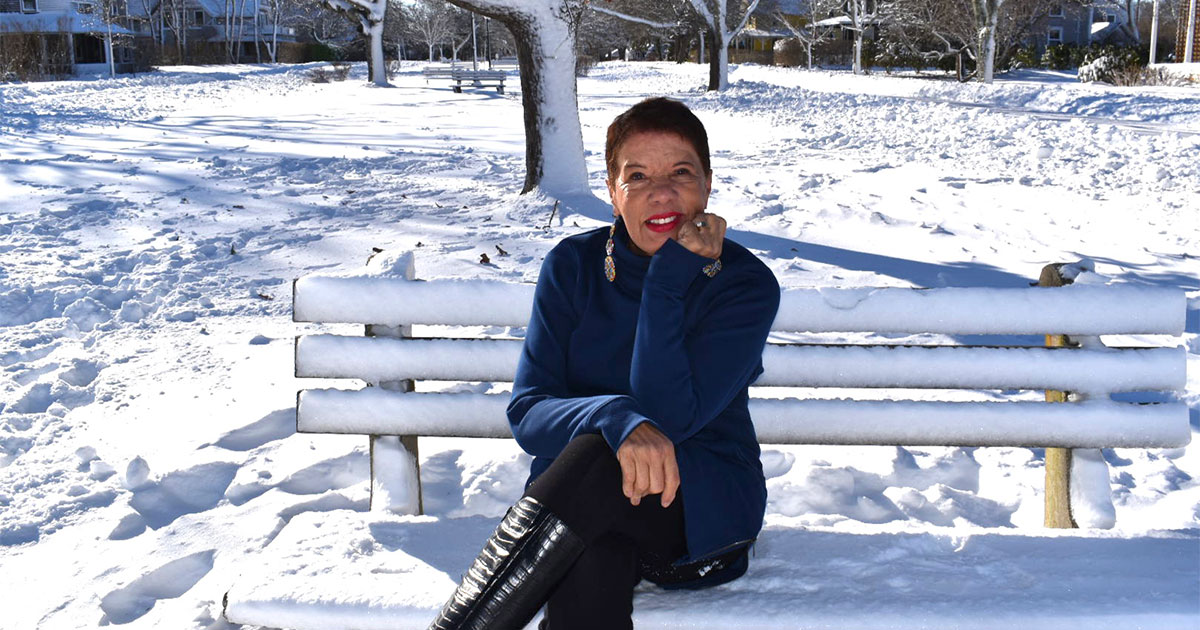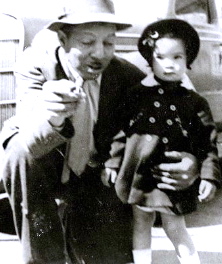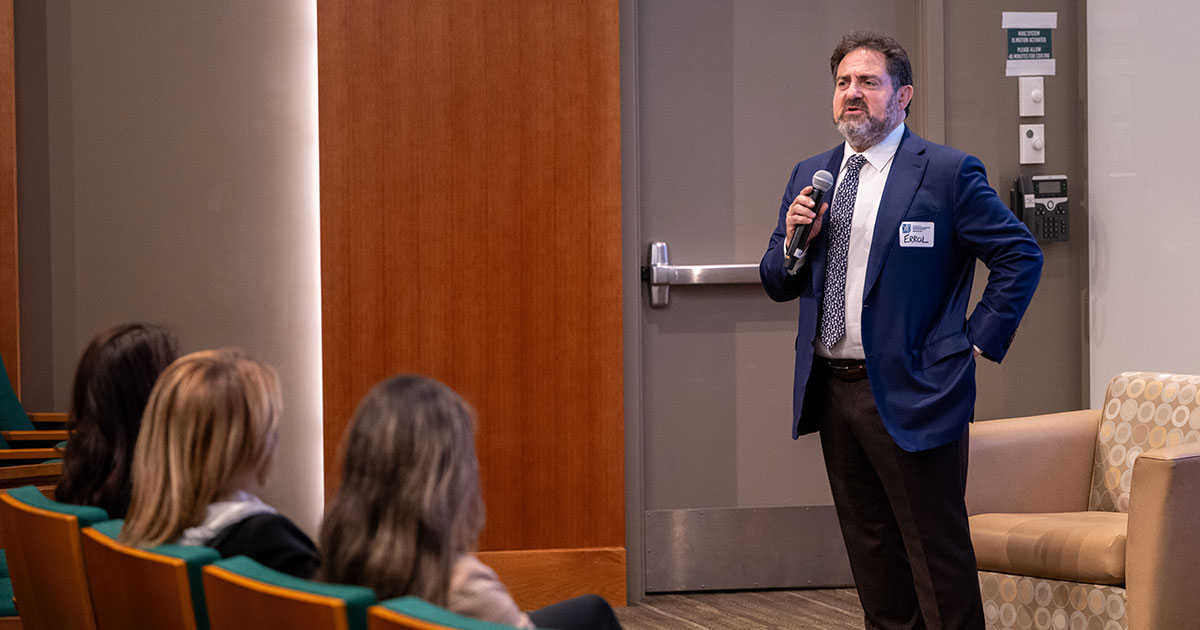Taking Steps Toward Justice and Dignity

Growing up, before she went to bed at night, Jane C. Edmonds’ dad would ask about her day.
Specifically, he wanted to know what good she had done. Did she help anybody? Did she lift anyone up who was having a hard time? “He pushed me early on, asking how I used my day,” says Edmonds, the vice president for programming and community outreach at Babson College.
Edmonds’ dad, Thomas Andrew Center, faced challenges that came with being poor and Black in America. Orphaned at 12, he left Georgia to live with distant relatives in Washington, D.C., and while he went on to earn a college degree, he still had trouble finding work. “He would cry to mother that he couldn’t get a job,” Edmonds says.
Despite his challenges, Edmonds’ dad believed in the power of people to make change. “I learned early on from my dad that you have power as an individual,” Edmonds says. “You use your power, which he always said was a gift from God, to make a difference. You use your power to help all of humankind to have justice and dignity.”

Jane C. Edmonds, as a child, with her dad, Thomas Andrew Center, who inspired her to make a difference in the world every day.
Throughout her wide-ranging career, Edmonds has done just that, fighting for civil rights in a variety of positions in government, academia, and in her own consulting firms. Having spent a lifetime uplifting people that have been denied their fair rights and opportunities, she has been named to the board of directors of the National Center for Civil and Human Rights, a museum and human rights organization based in Atlanta. “I am honored,” she says. “Here is an opportunity to further act out all my life’s work—work that is in my DNA—with this incredible organization that has national, and even international, reach.”
The work for justice is long and never-ending, but all these years later, Edmonds still holds true to the ideal instilled in her by her father, of trying to make a difference in the world one day at a time. “I get up every morning and think about how I can make the best of the day,” she says. “That’s how I was brought up.”
Many Stops
Edmonds has made many stops during her career. In government, she served as the first chair of the Massachusetts Commission Against Discrimination under Gov. Michael Dukakis, and later, as the Massachusetts Secretary of Workforce Development under Gov. Mitt Romney.
Edmonds may be a Democrat, but she found common ground with Romney, a Republican, and was even a speaker at the 2012 Republican National Convention that nominated him to run for president. “He is fascinated with different perspectives,” she says. “The beauty is he is a consummate gentleman.”
“I learned early on from my dad that you have power as an individual. You use your power, which he always said was a gift from God, to make a difference. You use your power to help all of humankind to have justice and dignity.”
Jane C. Edmonds, vice president for programming and community outreach at Babson College
For more than 20 years, she ran Jane C. Edmonds & Associates, a trailblazing workforce development and diversity leadership firm. That firm closed in 2003, but then in 2020, Edmonds co-founded Jane’s Way, which partners with organizations to create cultures of diversity, equity, and belonging. One of the other co-founders of Jane’s Way is Babson’s Elizabeth Swanson, the Andrew J. and Joyce D. Mandell Family Foundation Senior Term Chair and a professor of literature and human rights.
In academia, Edmonds taught leadership at Northeastern University and, now as a vice president at Babson, she performs outreach and develops programs with organizations throughout Greater Boston, addressing issues such as recidivism and diversity. With Babson Executive Education’s Leadership Program for Women and Allies, she engages with leaders in candid conversations about race, bias, and inclusion.
Edmonds says that Babson takes the work of diversity, equity, and inclusion seriously. “The strength of Babson is the people in the community,” Edmonds says. “It has great potential to use the power the institution has to do good around the world.”
The Power of We
Throughout her life, Edmonds has not been afraid to fight for what is right. In the 1970s, in the face of lingering racial segregation, Jane and her husband encountered a developer who inflated the price of a home they wanted to buy. A lawsuit followed. “We got the house,” Edmonds says.
Later, in that same town, she ran for school board against a popular incumbent and won, and she still remembers the crowded election night celebration that took place in that house she had fought so hard to buy. “Our house was shaking with joyous vibrations,” she says.
Not all her fights are so public. Sometimes, they are quieter. Recently, she attended a summer cocktail party, and one of the guests, an older white man, informed her that “blacks and whites, they will never be friends.”
“The strength of Babson is the people in the community. It has great potential to use the power the institution has to do good around the world.”
Jane C. Edmonds
In her life, Edmonds has witnessed the opposite, that people of all colors can not only be friends but also work toward justice together. Sipping her wine, Edmonds remained cool and unruffled and didn’t get into an argument with the guest. Instead, she simply said, “Tell me more about that,” and proceeded to listen and engage with him.
“I am willing to have a conversation with anyone who is willing to have it,” she says. “Do I think it changed the world? Probably not. But, I was using the power I have to take a step toward justice and dignity, and changing perceptions that limit both.”
The fight for justice, however, is not an easy one. Setbacks happen. Progress can be slow, but Edmonds keeps at it. “I believe in this country,” she says. “I refuse to succumb to negativity.” That positive attitude comes, in part, from her childhood in Cambridge, Massachusetts, where her house was often filled with visitors. Her father was the founder of a local chapter of a Black fraternity, and Black leaders, including Martin Luther King Jr. and Whitney Young, came to the house.
That left an impression on Edmonds. She was young at the time and didn’t always understand the conversations around her, but she saw the strength of people who come together as one.
“I truly believe in the power of we. The power of we keeps me going,” she says. “I get joyful when we make progress, even if it’s incremental. I get excited by seeing the good we are capable of.”
Posted in Community




